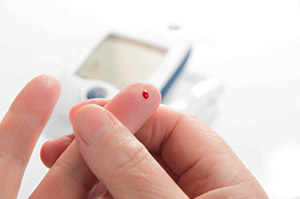Blood glucose meters, which millions of diabetics rely upon to regulate their blood sugar, have become less costly and easier and less painful to use.
But they haven’t become more accurate, a top Food and Drug Administration official said Tuesday at a meeting of researchers analyzing studies that show wide variation in the performance of the machines used to measure blood glucose levels.
 Katherine Serrano, diabetes branch chief in the FDA division of chemistry and toxicology devices, said the federal government is aware of accuracy problems with meters on the market. But she said the FDA is limited in its response because some manufacturers are in Asia, and the agency must rely on the manufacturers’ own studies related to accuracy.
Katherine Serrano, diabetes branch chief in the FDA division of chemistry and toxicology devices, said the federal government is aware of accuracy problems with meters on the market. But she said the FDA is limited in its response because some manufacturers are in Asia, and the agency must rely on the manufacturers’ own studies related to accuracy.
Health experts say if a blood glucose meter provides a false reading, it puts a patient at risk of dosing with too much or too little insulin. If too much insulin is given, it can bring blood glucose levels down to dangerously low levels, putting the patient at risk of severe hypoglycemia and possible hospitalization.
Typically, a person with diabetes tests his or her blood sugar before eating or exercising to find out if he or she is within normal range. The patient then uses insulin or diet to restore blood glucose to a healthy level. About 24 million people have diabetes in the Unted States, and nearly a third of that number rely on insulin to regulate their blood sugar.
Researchers at the Diabetes Technology Society meeting in Arlington, Va., presented several studies done in the United States and Germany showing it is common for many devices to fall short of the 95 percent accuracy standard required by the FDA. Consumers often buy the devices based on which is cheapest, or which is covered by their insurance policy without realizing that not all meters offer same accuracy, they said.
Serrano said several factors can reduce a meter’s accuracy, such as storing it in a hot or cold area, or failing to wash your hands before using them. She said studies done by manufacturers seeking approval are done in labs by trained personnel.
“There have been a lot of advances in the technology of the meters but we have not seen great strides in accuracy,” Serrano said.
She noted manufacturers don’t have much incentive to improve accuracy because federal law requires only that they prove they are “substantially equivalent” to another meter already on the market. The FDA relies on the manufacturer’s own studies to analyze accuracy and does not require any independent testing, she said. Here are some tips to help improve accuracy.






